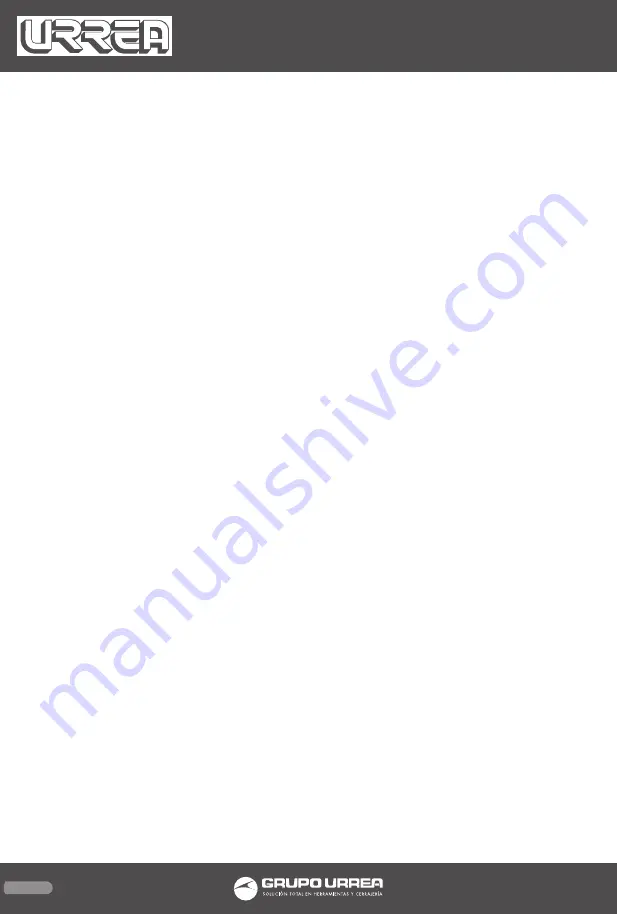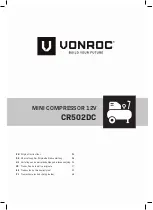
22
Compressor valves leaky, broken, carbonized
or loose. Inspect valves. Clean or replace as re-
quired. Install Valve/Gasket Step. Saver Kit.
Carbon build-up on top of piston(s). Clean
piston(s). Repair or replace as required.
Cylinder(s) or piston(s) scratched, worn or
scored. Repair or replace as required.
Connecting rod, piston pin or bearings worn
or scored. Inspect all. Repair or replace as re-
quired. Install Bearing/Connecting Rod.
Loose bearing spacer on crankshaft. Step Saver
Kit.
Defective ball bearings on crankshaft or motor
shaft. Inspect bearings and replace if required.
Install Bearing/Connecting Rod. Step Saver Kit.
MOISTURE IN CRANKCASE OR MILKY AP-
PEARANCE IN PETROLEUM LUBRICANT OR
RUSTING IN CYLINDERS
Detergent type lubricant being used. Drain ex-
isting lubricant and refill with proper lubricant.
Extremely light duty cycles. Run compressor
for longer duty cycles.
MOTOR OVERLOAD TRIPS OR DRAWS EX-
CESSIVE CURRENT
Air leaks in air discharge piping. Check tubing
and connections. Tighten joints or replace as
required.
Lubricant viscosity too high. Drain existing lu-
bricant and refill with proper lubricant.
Drive belts too tight or misaligned. Adjust
belts to proper tension and alignment.
Compressor valves leaky, broken, carbonized
or loose. Inspect valves. Clean or replace as re-
quired. Install Valve/Gasket Step. Saver Kit.
Automatic drain valve clogged, leaking or de-
fective. Inspect valve and clean, repair or re-
place as required.
Cylinder(s) or piston(s) scratched, worn or
scored. Repair or replace as required.
Connecting rod, piston pin or bearings worn
or scored. Inspect all. Repair or replace as re-
quired. Install Bearing/Connecting Rod.
Loose bearing spacer on crankshaft. Step Saver
Kit.
Defective ball bearings on crankshaft or motor
shaft. Inspect bearings and replace if required.
Install Bearing/Connecting Rod. Step Saver Kit.
Ambient temperature too low. Install crank-
case heater kit. Relocate compressor to warmer
environment.
OIL IN DISCHARGE AIR (OIL PUMPING)
Lubricant viscosity too low. Drain existing lu-
bricant and refill with proper lubricant.
Lubricant level too high. Drain excess lubricant.
Detergent type lubricant being used. Drain ex-
isting lubricant and refill with proper lubricant.
Piston rings damaged or worn (broken, rough
or scratched). Excessive end gap or side clear-
ance. Adjust piston rings.
Cylinder(s) or piston(s) scratched, worn or
scored. Repair or replace as required.
Crankshaft seal worn or crankshaft scored. Re-
place seal. Install shaft sleeve if required. Install
Bearing/Connecting. Rod Step Saver Kit.
Worn cylinder finish. De glaze cylinder with
180 grit flex-hone.
OIL LEAKING FROM SHAFT SEAL
Crankshaft seal worn or crankshaft scored. Re-
place seal. Install shaft sleeve if required. Install
Bearing/Connecting. Rod Step Saver Kit.
SAFETY/RELIEF VALVE “POPS”
Clogged or dirty inlet and/or discharge line fil-
ter. Clean or replace.
Air leaks in air discharge piping. Check tubing
and connections. Tighten joints or replace as
required.
Defective safety/relief valve. Replace.
High pressure inlet valve leaking. Inspect,
clean or repair as required.
HIGH INTER-STAGE PRESSURE
High pressure inlet valve leaking. Inspect,
clean or repair as required.
LOW INTER-STAGE PRESSURE
Low pressure discharge valve leaking. Inspect,
clean or repair as required.
MOTOR WILL NOT START
Improper line voltage. Check line voltage and
upgrade lines as required. Contact electrician.
Wiring or electric service panel too small. In-
stall properly sized wire or service box. Contact
electrician.
Poor contact on motor terminals or starter
connections. Ensure good contact on motor
terminals or starter connections.
Improper starter overload heaters. Install
proper starter overload heaters. Contact elec-
trician.



































